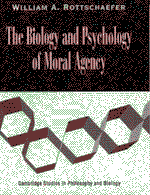Book contents
- Frontmatter
- Contents
- Preface
- Introduction
- PART I MORAL AGENCY AND SCIENTIFIC NATURALISM
- PART II THE BIOLOGICAL BASES OF MORAL AGENCY
- PART III THE PSYCHOLOGICAL BASES OF MORAL AGENCY
- 5 Behaviorally based moral capacities: How do we learn to behave morally?
- 6 The social cognitive bases of morality: How do we learn to act morally?
- 7 The neurophysiological bases of moral capacities: Does neurophysiology have room for moral agents?
- PART IV A SCIENTIFIC NATURALISTIC ACCOUNT OF MORAL AGENCY
- PART V INTEGRATING A PERSONALISTIC AND NATURALISTIC VIEW OF MORAL AGENCY
- References
- Index
6 - The social cognitive bases of morality: How do we learn to act morally?
Published online by Cambridge University Press: 19 September 2009
- Frontmatter
- Contents
- Preface
- Introduction
- PART I MORAL AGENCY AND SCIENTIFIC NATURALISM
- PART II THE BIOLOGICAL BASES OF MORAL AGENCY
- PART III THE PSYCHOLOGICAL BASES OF MORAL AGENCY
- 5 Behaviorally based moral capacities: How do we learn to behave morally?
- 6 The social cognitive bases of morality: How do we learn to act morally?
- 7 The neurophysiological bases of moral capacities: Does neurophysiology have room for moral agents?
- PART IV A SCIENTIFIC NATURALISTIC ACCOUNT OF MORAL AGENCY
- PART V INTEGRATING A PERSONALISTIC AND NATURALISTIC VIEW OF MORAL AGENCY
- References
- Index
Summary
THE COGNITIVE TURN IN PSYCHOLOGY
We have seen that an adequate scientific account of moral agency must include reference to our cognitive capacities. The questions of how we acquire and put into action our moral capacities cannot be answered satisfactorily by appealing only to evolutionarily based and learned, but noncognitive, moral capacities. In particular, we saw in Chapter 5 that the Skinnerian claim that the science of operant behavior is the science of values fails because it does not take account of the cognitive features of human agency. Our conclusion rested in large part on the findings of psychologists who have shown that cognitive factors play a role in the explanation of human behavior. This turn to the cognitive in psychology is not reserved for critics of behaviorist theory; it is part of what has come to be called the cognitive revolution in psychology, which has taken two forms. For want of better descriptions, I shall call one cognitive revolution the representational revolution and the other the agential revolution. The representational revolution focuses on human knowledge-gaining capacities and achievements. It has developed in the areas of perception, memory, imagery, language, thought, and problem solving. The agential revolution is concerned with issues of human action. It has emerged in the areas of learning, motivation, personality, social psychology, and abnormal psychology.
- Type
- Chapter
- Information
- The Biology and Psychology of Moral Agency , pp. 125 - 153Publisher: Cambridge University PressPrint publication year: 1997

